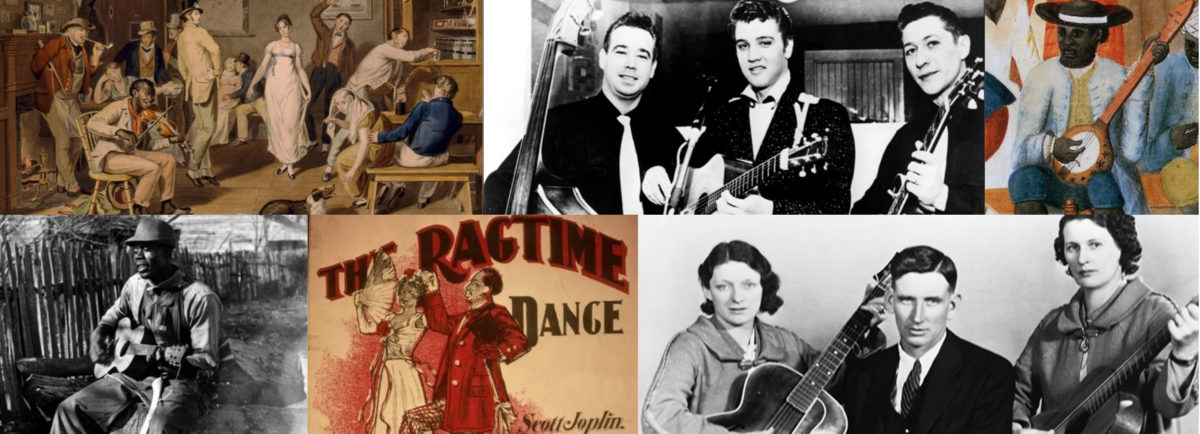Audio Investigation Slide
Worried Man Blues: Audio Investigation Slide
-
- Click the link above to launch the slide.
- Click the media player in the bottom right corner of the slide to begin audio playback of the song.
- Invite students to respond to the following questions shown on the slide:
-
- Why was the singer of the song arrested?
- What was his sentence?
- Does the sentence seem fair to you? Why or why not?
- How will the singer serve his sentence?
- What do you think the lyric, “I’m worried now, but I won’t be worried for long,” implies?
-
- Students should be able to answer the first, second, and fourth questions easily, since the lyrics that address these points are very clear. They may be unfamiliar with the terms, vagrant and vagrancy laws, though, so after students share their responses to those questions, you can supply and clarify the terms for them. Student responses to the third and fifth questions will likely vary and issues of excessive sentencing and exceptionally harsh conditions of forced labor can serve as a springboard into the lesson.
Recommendations
This song is useful for introducing a lesson on the experiences of freedmen and African Americans generally in the South during and after Reconstruction.
Although the version that the students heard was recorded in 1930 and sung by the Carter Family, whose members were white, this is a late 19th century folk song that details an experience strikingly similar to those experienced by many African American in the South under the Black Codes after the Civil War. If Black Codes is not already a vocabulary term that students know, provide a definition and multiple examples of the types of restrictions the codes entailed, as well as the frequent recategorization of many petty crimes as felonies. You may want to review briefly the various Reconstruction plans put forth by Presidents Lincoln and Johnson, as well as the Radical Republicans in Congress, and then ask whether students think that the Black Codes arose during the implementation of Johnson’s plan or Congress’ plan. They should recognize that the leniency of Johnson’s plan allowed white supremacist governments to remain in power and that those governments implemented the Black Codes as a way to retain white supremacy in the absence of slavery, but you may need to prompt them to ensure that they see this connection. Additionally, you might ask students why they think that the Black Codes were not eliminated after Congress implemented its Reconstruction plan. This is an opportunity to address the limitations of the congressional plan and the reasons that Reconstruction ended in the early 1870s, during Grant’s presidency.
After providing that context, you can elaborate on the vagrancy laws that are alluded to in the lyrics, and that were central to the Black Codes in southern states. The codes and these laws typically required that African Americans must be able to supply proof of lawful employment, as defined by the Black Codes, on demand. Lawful employment usually meant working as a contract laborer, and in some states, African Americans were not allowed to enter certain occupations. Failure to show proof of lawful employment resulted in arrest under a state’s vagrancy laws. The fines levied for vagrancy offenses were often beyond the means of African Americans arrested under those laws, and the inability to pay meant a sentence of hard labor under the convict leasing system. Sentences were a minimum of three months but frequently stretched over many years, well beyond what is proportional for such an offense. After explaining the convict leasing system, you might ask students to consider the extent to which it was similar to and different from the institution of slavery in terms of its role in the economies of southern states.
Vocabulary
shackles – “a pair of fetters connected together by a chain, used to fasten a prisoner's wrists or ankles together.”
vagrant - a homeless and/or unemployed person who survives by begging or performing temporary work
vagrancy laws - state and/or municipal laws that allow police or other authorities to take vagrants into custody, usually for loitering, begging, and petty crimes; these laws existed throughout the United States, but in southern states during and after Reconstruction, such laws were part of the Black Codes that severely restricted the liberties of African Americans
convict leasing - system implemented in many southern states after the Civil War whereby individuals convicted of crimes were leased out to private individuals and businesses to perform labor in exchange for a fee paid to the state; both white and African American convicts performed forced labor in this system, but because of the Black Codes, African American convicts were overrepresented
Additional Resources
Primary Source Strategies
Printable worksheets with response prompts that guide students in analyzing songs as primary sources.

